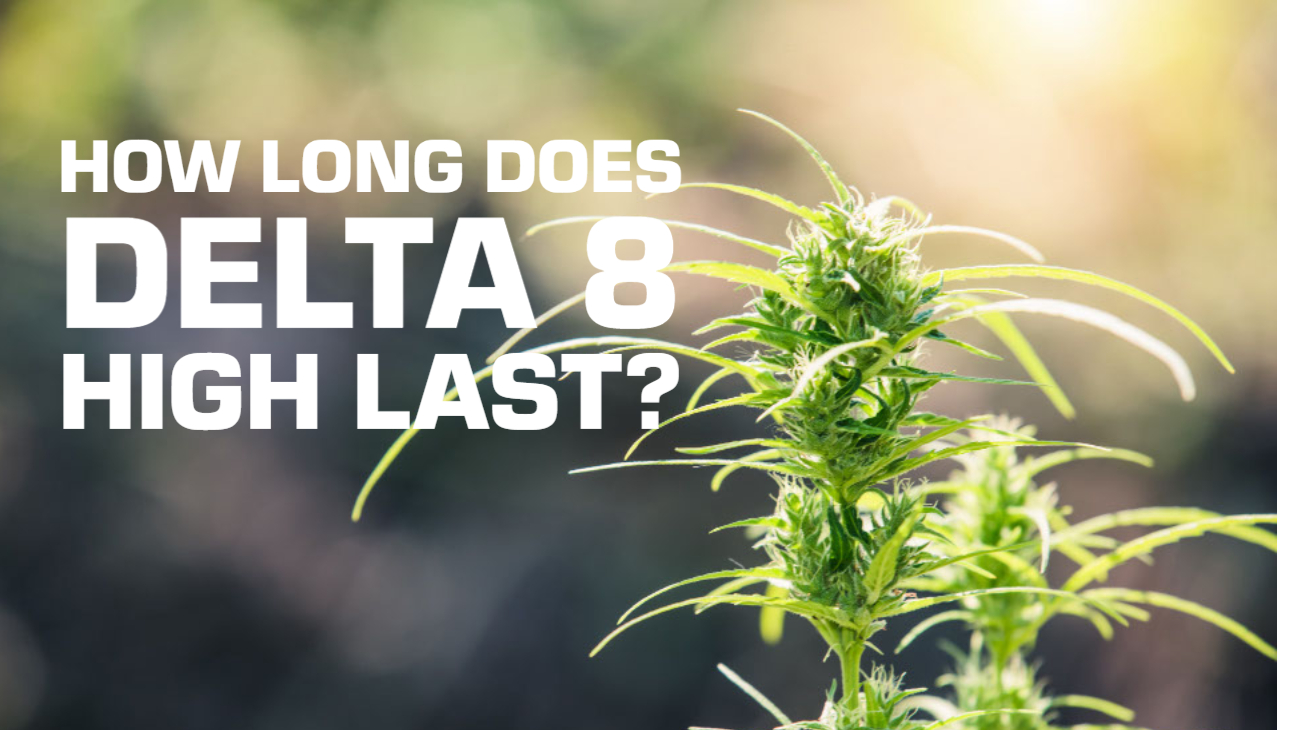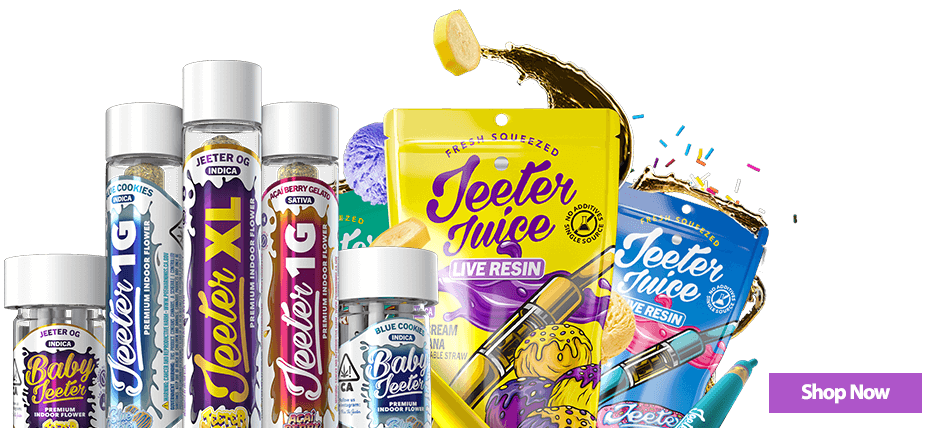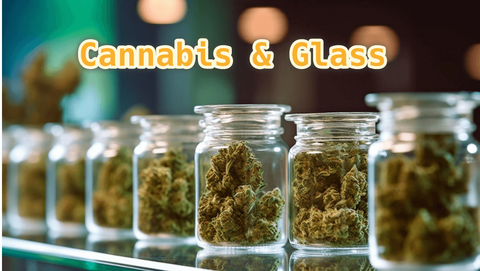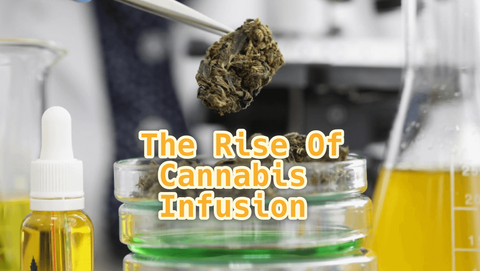Latest Blog Posts
Top rated

How Long Does Delta 8 High Last?
It is only a matter of time before research and applications of all of marijuana's cannabinoids are developed. One of these compounds that are gaining recognition is called delta-8, and it offers distinctive characteristics in addition to the possibility of providing benefits. You still have a lot to learn about delta-8, despite the fact that it is not nearly as strong as regular delta-9.
Marijuana is a highly complex plant that contains over 100 unique cannabinoids in addition to more than 300 additional chemicals of interest. In order to have a deeper understanding of this favorite plant, you still have a lot of mysteries to solve.
When these cannabinoids are separated from one another and extracted, they have the ability to provide a wide range of effects and advantages. There are two that stand out among the rest for their popularity, and they are obviously, cannabidiol (also known as CBD) and delta-9-tetrahydrocannabinol, which is more commonly referred to as THC. Both of these are found in cannabis.
However, what exactly is delta-8? How long does its high last? Continue reading to acquire a fundamental understanding of this fascinating molecule.
A Psychoactive Molecule That Can Be Found In Marijuana Plants Of The Sativa Kind
Delta-8 is another name for the chemical compound tetrahydrocannabinol. It is a psychoactive molecule that can be found in marijuana plants of the Sativa kind. Both its chemical makeup and its name are comparable to that of the widely used delta- 9, but its physical characteristics are distinct. There are over one hundred different cannabinoids that are found naturally in the cannabis plant. Since delta-8’s presence in the plant is not as substantial as that of other cannabinoids, concentrated quantities of delta-8 are produced by extracting THC from cannabis. Many people prefer cannabis Sativa from naturally occurring cannabinoids.
Delta-8, which is only produced in trace levels by the cannabis plant, has recently gained a significant amount of popularity due to the fact that it has effects that are similar to those of delta-9 but are less intense. However, as of right now, the only method to experience delta-8 is through the use of particular cannabis concentrates. This is because delta-8 is not as easily available as other varieties of marijuana.
In addition to a number of other factors, delta-8 exists in a legal limbo zone. As a matter of fact, the legal penalties of this cannabinoid have been debated for a very long time, and as a direct result, its accessibility varies significantly from country to country.
How Is Delta-8 Produced? How Much THC Is In Delta-8 THC?
A variant form of THC is known as delta-8. In general, its potency is roughly equivalent to that of delta-9. However, this does not mean that delta-8 does not create any impact; instead, it simply produces a high that is distinct from the high that is produced by regular marijuana.
The process of creating delta-8 begins, as it does with the majority of cannabinoids, with the acid form of the cannabinoid, also known as CBGA. CBGA is the original molecule from which various cannabinoids are produced. This molecule is also referred to as the "cannabis stem cell," and it is in this cell that mature cannabis has THCA. This phase of the process is known as the decarboxylation process, where carbon molecules (CO2) are lost and results in the production of delta-9, which is then transformed into delta-8 through an aging treatment by oxidation. The harvested plant that contains THCA goes through a process in which the carboxyl group is removed in the form of carbon dioxide through exposure to heat or UV light.

Instead of being produced by selective breeding, delta-8 flower is made by "aging" regular marijuana flowers. Because of this, the flowers themselves need to be in healthy condition for the process of "age" to be successful.
This is accomplished in the following ways.
1. CBD Is Dissolved In A Solvent That Is Suitable For The Purpose.
It is not possible to isolate delta-8 using ethanol, in contrast to other cannabinoids. Heptane, which is a non-polar organic solvent, is used in its place to dissolve CBD.
2. An Acid Is Added To The Solvent After It Has Been Mixed.
After combining the heptane mixture with an acid, such as hydrochloric acid, the next stage in the process of generating delta-8 is to combine these two components. At a temperature of 100 ° C., the solution that is obtained is agitated nonstop for a minimum of 18 hours in order to get the best possible outcomes. Since regular stirring at a consistent temperature is required for this purpose, a hotplate with a stirrer is frequently utilized as the appropriate tool.
3. The Combinations Are Cleaned And Sterilized
The next phase, which is maybe the most critical one, involves determining what to do with the mixture after it has been thoroughly blended. Because acids and solvents were used in the process, there is a possibility that harmful residues will be left behind. As a result, it is essential to thoroughly clean and purify the delta-8. In order to purify the mixture for this objective, an impurity-removing solution that consists of distilled water and baking soda is utilized.
4. Analysis Of Delta-8
In order to create delta-8, the converted extract must first be analyzed. This is the last step in the process. Techniques such as high-performance liquid chromatography are utilized by manufacturers in order to evaluate the effectiveness of the extract and make sure that no potentially dangerous substances have been left behind.
Is There Any Strain That Naturally Contains A High Amount Of Delta-8 THC?
There are a few variants (strains) of hemp flowers that have a marginally higher concentration of delta-8 than the average.
Because there are no particular enzymes that are responsible for the production of this cannabinoid, it is difficult for plant breeders to selectively cultivate cannabis strains that have a higher concentration of delta-8. There is no way to selectively grow plants that naturally produce delta-8; hence this cannot be done.
The generation of delta-9 results in the creation of all of the delta-8 that is found in cannabis. Fresh cannabis plants often have a lower concentration of the cannabinoid known as delta-8 tetrahydrocannabinol (THC) in comparison to the cannabis blossoms that have been preserved for extended periods of time.
The production of delta-8 flower does not include selective breeding but rather the "aging" of conventional marijuana flower. This involves gathering the flowers and putting them in an environment that will encourage their transformation from delta-9 to delta-8 as quickly as possible (through exposure to ultraviolet light and oxygen).
Chemical conversion is another strategy that some businesses opt to implement. Extracts of marijuana can be treated in a manner that results in a significant amount of delta-9 being converted to delta-8.
What Effects Does The Delta 8 THC Strain Have?
A clear high that will amplify your senses to be more intense and precise, making it incredible to consume while engaging in outdoor activities; in the end, its use will not cause anxiety or confusion. The effects of delta-8 are comparable to those of delta-9 but are considered to be between 50 and 75 percent less potent.
This means that you will continue to perceive the exact effects of relaxation as those offered by delta-9, but without losing focus, a clear high that will amplify your senses to be In addition, the shelf life of delta-8 is significantly longer than that of THC, meaning that it can be preserved for a considerably more extended period of time while maintaining its properties. This means that even if you go for a more extended period of time without consuming it, you don't have to worry about not getting the desired effects because cannabis degrades over time.
Positive And Beneficial Medical Effects Of Delta-8
Delta-8 shows promise as a possible replacement for THC and as a therapeutic compound that could be used to treat a wide range of medical conditions. According to the National Cancer Institute in the United States, delta-8 is similar to tetrahydrocannabinol. Tetrahydrocannabinols have properties that can be used in medicine to treat a variety of conditions, including nausea and vomiting, loss of appetite, anxiety and panic attacks, and pain relief due to the presence of their analgesic properties.

Patients undergoing cancer treatment can benefit from these medical benefits provided by the effects of delta-8. This is what the findings of the various studies that have been conducted up to this point have shown, and gradually new studies and points of view concerning the therapeutic application of delta-8 are coming to light.
Positive Effects On Various Diseases
Many individuals claim that regular use of delta-8 has made it possible for them to have a high-quality sleep, as well as relaxation and tranquility that is unbroken. As a result, they report that their lifestyle has vastly improved, and they feel significantly less anxious and stressed. However, the mechanism through which delta-8 operates in your body is one of a kind, just like any other cannabinoid. Because it has effects similar to those of THC, delta-8 can not only alleviate all of these points of discomfort, but it can also be beneficial in the treatment of certain diseases and mental illnesses.
Pain
The use of delta-8 immediately results in considerable improvements in the alleviation of pain and inflammation associated with injuries. Delta-8 is sometimes used in patients with chronic diseases such as multiple sclerosis or for those who are receiving cancer treatments such as chemotherapy. This is due to the substance's dual role in relieving severe pain in both of these types of patients.
Anxiety
Many people claim that smoking delta-8 gives them similar feelings as getting high on THC, but with less of a cloud over their head and more ability to concentrate on tasks at hand. Consuming delta-8 won't impair your ability to think clearly, and you won't lose access to the inspiration and calm that come naturally in the present; for this reason, you can take it even while you're going about your everyday business.
Nausea Reducing Substance With Appetite-Stimulating Properties
As with the vast majority of phytocannabinoids, delta-8 binds to the CB1 receptors of the endocannabinoid system in human bodies. The endocannabinoid system is a receptor system that helps to keep the metabolic process of living beings in a state of equilibrium. It is for this reason that delta-8 is achieved through a greater stimulation of appetite and a reduction in nausea. In point of fact, a study that was carried out in 1995 found that when cancer patients were given a dose of 18mg of delta-8 in edible oil, it was observed that in 480 of those cases, the participants were able to stop vomiting while they were receiving treatment.
Products That Contain Delta-8
Because delta-8 is produced using CBD that is derived from hemp, it can be provided in a number of different formats. These formats range from edibles, such as candies, cookies, breakfast cereals, gummies, and chocolates, to infusions, such as teas and drinks, and of course also include cartridges for vaping, dabs, shatter, or smokable hemp with delta-8 extract. Additionally, it is offered in collector formats like raw buds, as a point of illustration.

Delta-8 Distillates
The distillate of delta-8 comes in the form of a thick brown paste that may be utilized for a variety of purposes, including smoking the resin through the use of dabs, adding it to a vaporizer or pipe, or even baking cookies or cupcakes with it. The distillate is obtained by separating some groups of compounds, but without separating the delta-8 from the delta-9, in turn, are subjected to a chemical process to convert as much of the delta-9 in delta-8 that, in the end, humans obtain cannabidiol with 50-70% of delta-8 and 1 to 5% of CBD. Cannabidiol is derived from the cannabis plant and has psychoactive properties.
Delta-8 Oils
The delta-8 can be presented as a distillate of hemp oil, which is a prevalent and straightforward method of consumption. It can be in the form of a liquid that is clear and viscous and flows very easily. Since it is so simple to work with, heating it before transferring it enables an exact and accurate dosage while also preserving the cannabinoid's shelf life.
Gummies
If you are new to the world of marijuana, the sweet gummies made from delta-8 will be your perfect ally to start and enjoy the most out of this experience because they are super easy to dose and rich in sweet and delicious terpenes. These delightful gummies typically have between 5 and 10 milligrams of THC per piece.
The Vaporizer, Together With The Cartridges
Disposable vaporizers are among the most prevalent ways in which delta-8 is consumed by consumers. Using delta-8 for your vaping experiences will, without a shadow of a doubt, provide you with an ideal setting to obtain that peaceful and tranquil experience, which, in turn, will leave you with merry flavors in your mouth for a considerable amount of time. As a result of the surge in demand, several businesses have begun manufacturing pre-made cartridges that are compatible with the most popular kinds of vaporizers.
How Long Does Delta-8 High Last?
Even though delta-8 is progressively gaining favor among cannabis enthusiasts, no one can deny the fact that it is still a relatively new compound on the cannabis market.
Many of its effects have not yet been fully understood, and scientists from all around the world are continuing their research into them. Because of this, there will invariably be inquiries regarding its effects, side effects, benefits, and safety.
When people inquire about this cannabinoid, one of the questions that are frequently asked is, "How long does the impact last?"
Because marijuana consumers and delta-9 lovers make up the majority of the market for delta-8, consumers frequently inquire about whether or not the effects are comparable to those of delta-9. On the other hand, the response is not as straightforward as you may have imagined it to be. The answer to this question cannot be given in a single phrase, let alone a single word.
Physiological Factors That Play A Role In The Development Of Particular Effects
Cannabinoids have a variety of effects, and these effects are determined by a variety of physiological factors, such as an individual's metabolism, body weight, age, gender, and level of tolerance to the substance. Cannabinoids can have a variety of effects, and these effects can range from mild to severe.
For instance, a person who is athletic or slender and who has a fast metabolism will generally experience the effects of cannabinoids for a much shorter period of time in comparison to a person who is heavily built and who has a slower metabolism, and who may also use cannabis only on occasion. This is due to the fact that cannabinoids are metabolized at a faster rate in a person with a quicker metabolism. This is because the body produces more cannabinoids in response to high doses of a chemical than it does in response to low doses of the same substance.
Both the kind of cannabis product that was used and the amount of it that was consumed can have an effect on how long the results of the drug continue to be felt after use. The former is often beyond anyone's power to have any kind of influence, but the individual who will be using the product does have some input in the matter.
Various Products Containing Delta-8 And The Length Of Their Effects
Cannabinoid products have effects that typically last anywhere from two to eight hours on average. There is a lack of scientific evidence that supports the effects of delta-8 and the durability of its effects. In any way, consider some different products and the possible length of their effects.
Gummies And Other Edible Products
The manner in which a cannabis product is absorbed by the body determines not only how long it takes for the cannabinoid product to generate its effects but also how long it takes. Compounds that must first undergo metabolism in the digestive system typically require more time to exert their effects compared to products that can reach the bloodstream directly via the glands in the lungs or the tongue.
The mucous membranes of the mouth and the glands on the tongue are both responsible for some of the absorption of delta-8 from gummy candies. They don't have to hold out on starting the digestive process until they get to the stomach because they can do it there. As a result, the effects of the gum and candy can begin to kick in anywhere between 15 and 30 minutes after consumption.
On the other hand, in contrast to the effects of different food goods, this one can wear off very rapidly. The impact could perhaps continue for a total of six to seven hours.
Tinctures
Tinctures function very similarly to gummies, although they are significantly more effective. The sublingual glands in the mouth are responsible for practically the entirety of the absorption process.
The cannabinoids, together with the oil, are absorbed via the mucous membranes of the mouth and the glands located under the tongue. As a result, the effects begin to take place anywhere from 15 to 30 minutes after administration. The effects can be expected to last anywhere from three to five hours.
Dabs And Vaporizers
The fact that the effects of dabs, vapes, and other items that are inhaled are felt almost immediately has contributed to their widespread popularity. Cannabinoids that are inhaled get into the bloodstream through the alveoli and start having an effect right away (within 10-15 minutes).
On the other hand, the effects disappear much more rapidly - anywhere between three and five hours!
%20(1).jpg?1666728475544)
Please keep in mind that, as was said earlier, the times listed here are simply estimates. These values are not the same for everyone because they depend on many different individual physiological factors. A regular user will experience a less intense effect than a user who only does so on occasion, and the effects of the typical user will also fade away more rapidly. On the other hand, it will take a person with a strong constitution significantly more time to accumulate cannabinoids compared to a person who has a quicker metabolism and a smaller body mass.
Effects Of Delta-8
There is a lack of studies in the scientific literature that can pinpoint the precise physiological impacts that delta-8 has (and the mind). The majority of individuals are likely to react favorably to a moderately euphoric experience. On the other hand, the vast majority of anecdotal data suggests that the high created by delta-8 is significantly less potent than that produced by delta-9, which is the primary psychoactive component of marijuana.
There is some evidence that delta-8, a specific kind of the psychoactive compound tetrahydrocannabinol (THC), possesses psychoactive properties. In contrast to cannabidiol (CBD), tetrahydrocannabinol (THC) attaches to the CB1 receptors that are located throughout human brains and cause a state of euphoria.
Because of the similarities in their chemical structures, all THCs share comparable characteristics. However, the precise position of the C=C double bonds is a little bit different from one another. In the form of THC, known as delta-9, the double bond appears on the carbon chain at the ninth position, whereas in the form of THC, known as delta-8, it appears on the carbon chain at the eighth position. Because of this very tiny difference, their qualities, and consequently their effects, are slightly different from one another.
Ability To Produce A Mild Intoxication, More Commonly Referred To As A "Happy Feeling" Or "High"
Delta-8 does not produce the undesirable side effects that are associated with delta-9, such as paranoia, hallucinations, and other psychotic symptoms. Delta-8 is recognized for its ability to produce a mild intoxication, more commonly referred to as a "happy feeling" or "high." It creates a sensation of intoxication and euphoria that is almost equal to that of delta-9, but the effects are significantly milder, and there are no adverse side effects.
Second, because it is a more quiet version, delta-8 is able to more effectively give the various benefits that are typically associated with THC.
- One study that looked at patients with pediatric cancer and was carried out in Israel found that delta-8 has powerful anti-emetic qualities while having almost no adverse effects.
- Another study carried out in Israel found that low dosages of delta-8 increased hunger and, as a result, were effective in treating weight-related issues.
- Researchers have also investigated the pharmacological potential of delta-8 as it relates to the development of new medicines.
The Nature Of One's Experiences And Perceptions Might Vary Considerably
It is not yet known to what extent users' claims that taking delta-8 causes them to experience all of the beneficial effects that are generally linked with CBD and medical cannabis are accurate. Users claim that taking delta-8 causes them to experience these effects. The nature of one's experiences and perceptions might vary considerably. Pain and anxiety are subjective sensations that are never encountered in precisely the same manner by two different persons.
On the side of the current research, however, tests conducted so far have not shown any significant adverse impacts or side effects associated with delta-8.
However, it is essential to keep in mind that you should not consume too much delta-8 too quickly. The effects of an overdose are comparable to those of marijuana consumption. In spite of the fact that these negative consequences would be less severe, there is not much purpose in trying a sour apple when you may have a sweet apple instead. Right?
How Long Does The Substance Delta-8 Remain In The Human Body?
Delta-8 metabolites, like those of other forms of THC, stay in the body for an exceptionally extended period of time. You will be able to get rid of them more rapidly if you are diligent about the detoxification procedures that you utilize. In the event that this does not happen, the metabolites can stay in the body for a number of months.
Up to four months is the maximum amount of time that these metabolites are able to stay in the hair follicles. There usually are traces of THC present in the saliva for up to a week, although they can be found in the blood for around two months.
More than sixty percent of THC metabolites are expelled from the body via the gastrointestinal tract. Approximately thirty percent is excreted into the urine, where THC metabolites can persist for as long as forty-five days. Perspiration is responsible for the excretion of about twenty percent of the metabolites of THC. Your sweat may contain low levels of THC metabolites for as long as two weeks after you've used cannabis.
Nevertheless, these numbers are simply approximations. As was just indicated, there is some scope for variation.
Will The Drug Test Show Delta-8?
Delta-8 is still considered to be "THC," hence it is possible for it to provide a positive result on a drug test. Although some states continue to ignore it, delta-8 can be legally purchased and used in accordance with federal law in the United States.
Both types of THC are broken down in the human body producing metabolites that have a very similar appearance to one another. This is the explanation for the peculiar difference that has been observed. The testing facility will report a "positive" result on the drug test since it is only designed to detect THC metabolites already present in the body and does not differentiate between the various sources of the substance.
The length of time it takes for a test to identify THC metabolites in the body is contingent on the nature of the test as well as the amount of the substance that is present in the body. This is particularly important if you are traveling with delta-8 in your possession due to potential legal consequences that may apply for both possession and consumption purposes.
The hair follicle test is able to detect metabolites in your hair sample up to three months after your last use of the substance in question. Your urine sample can be tested for the presence of THC metabolites for up to 45 days using a urine test.
A saliva test may detect THC metabolites in saliva samples for up to seven days after use, whereas a blood test can detect them for up to two months after usage. Up to 15 days after taking delta-8, metabolites can be found in perspiration when they are subjected to a sweat test. Standard drug test panels can be used to check mouth's mucous membranes.
In cases of high consumption, the effect could last for a more extended period of time. On the other hand, if you have a quicker metabolism, it has a greater chance of being expelled from the body at a more rapid rate.
What You Need To Know To Get The Most Out Of Your Delta-8
So how exactly can you ensure that you are purchasing the most potent delta-8 products that will deliver an impact that is both powerful and long-lasting?
After all, delta-8 products are not known for their low prices. It is a time-consuming process to extract CBD in a secure manner and then convert it into delta-8. Due to the difficulty of the production process, the cannabinoid is very expensive. As a result, it is essential for you to verify that the item you are purchasing offers good value for the money.
- Purchasing Delta-8 products from a trustworthy company should be your first priority.
- Be sure to investigate both the source of the cannabis and the extraction method. Because of the stringent regulations that are in place, the cannabis that is grown in the United States and the European Union is considered to be of the highest quality.
- The process of CO2 extraction is now the most effective one available.
- Check the cannabinoid profile against reports from independent laboratories as well to check that it is consistent with the product description. It is recommended that delta-9 have a THC content of less than 0.3 percent.
- Take into account the strength of the product. If you are just starting out, you should begin with the smallest dose feasible. Begin, for instance, with a quarter of a gummy bear or one inhale from a vape. Keep track of the effects you get, and adjust the dosage up or down based on those readings.
- To overdose is the very last thing you want to happen. After taking delta-8, you should also avoid operating any heavy machinery or driving a vehicle. Thus, it's better you avoid a higher dose and don't seek to reach peak effects.
- Always use caution, and remember to look out for the well-being of others as well. Find the best consumption method to have better intoxicating effects.
What Happens When You Are Too High?
The effects of delta-8 can last for longer, despite the fact that it has a lower potency than the regular delta-9. The high from any cannabinoid typically lasts anywhere from four to twelve hours, depending on how it was used (with the highest high lasting only a few hours). It is possible to experience a psychoactive high that lasts longer than 12 hours due to the fact that everyone is unique and human bodies digest cannabinoids at various speeds.
Because there are not many stories of people becoming too high on delta-8, it can be challenging to know what to do if you find yourself in that situation. On the other hand, just like with regular delta-9, it is not possible to consume an unsafe amount of delta-8. Therefore, despite the fact that you might have some adverse reactions, it is essential to keep in mind that it is quite improbable that you will have a medical emergency.
If you take an excessive amount of delta-8, you run the risk of experiencing the undesirable effects that are described below:
- Problems in concentrating: delta-8 is proven to improve one's ability to focus and concentrate. It is possible that you have taken too much of it if you are finding it difficult to concentrate.
- If you feel as though you are lying down on a couch or if you have excessive head elevation, it's possible that you've taken too much of the drug. The head high can occasionally give you the impression that you are in a daze, while the body high can give you the impression that you are dizzy.
- It goes without saying that your eyes and mouth will be dry. The cannabis compound known as delta-8 has been shown to cause dry lips as well as dry eyes.
- Drowsiness and fatigue: If you feel sleepy or drowsy after taking it, you may have taken too much of it. THC generated from cannabis does not typically cause tiredness or mental cloudiness.
- Anxiety: If you take too much delta-8, you run the risk of developing paranoia and experiencing increased stress. If you take enough delta-8, you run the risk of experiencing these symptoms, even if they are not as severe as those associated with delta-9 products.
In case you feel you got TOO HIGH, follow these steps:
- Stay hydrated
- Keep calm and try to rest
- Eat something sweet
- Sniff some black pepper
- Distract yourself
- Talk to someone you trust
- Don't google: "i'm scared i'm too high"
- Next time: know your limits
The Bottom Line
Cannabinoids have a variety of effects, and these effects are determined by a variety of physiological factors, such as an individual's metabolism, body weight, age, gender, and level of tolerance to the substance. Cannabinoids can have a variety of effects, and these effects can range from mild to severe. Cannabinoids are known to produce a wide range of effects, some of which are pretty mild, while others can be quite severe.
For instance, a person who is athletic or slender and who has a fast metabolism will generally experience the effects of cannabinoids for a much shorter period of time in comparison to a person who is heavily built and has a slower metabolism and who may also use cannabis only on occasion. This is because a person with a slower metabolism will take longer for their body to metabolize the cannabinoids. This is due to the fact that a person with a higher metabolism metabolizes cannabis at a quicker pace than someone with a slower metabolism. This is due to the fact that when the body is exposed to a high amount of a chemical, it creates a greater quantity of cannabinoids than when it is exposed to a low dose of the same substance.
The length of time that the effects of cannabis continue to be felt after usage can vary depending on a number of factors, including the type of cannabis product that was used, as well as the amount of cannabis that was taken. When it comes to the latter, however, the person who will be utilizing the product does have some say in the matter, even though the former is typically outside of anyone's ability to exert any type of influence over it.
Disclaimer: This material is for informational purposes only and should not be relied on for legal, medical, financial, or any other form of professional advice.















